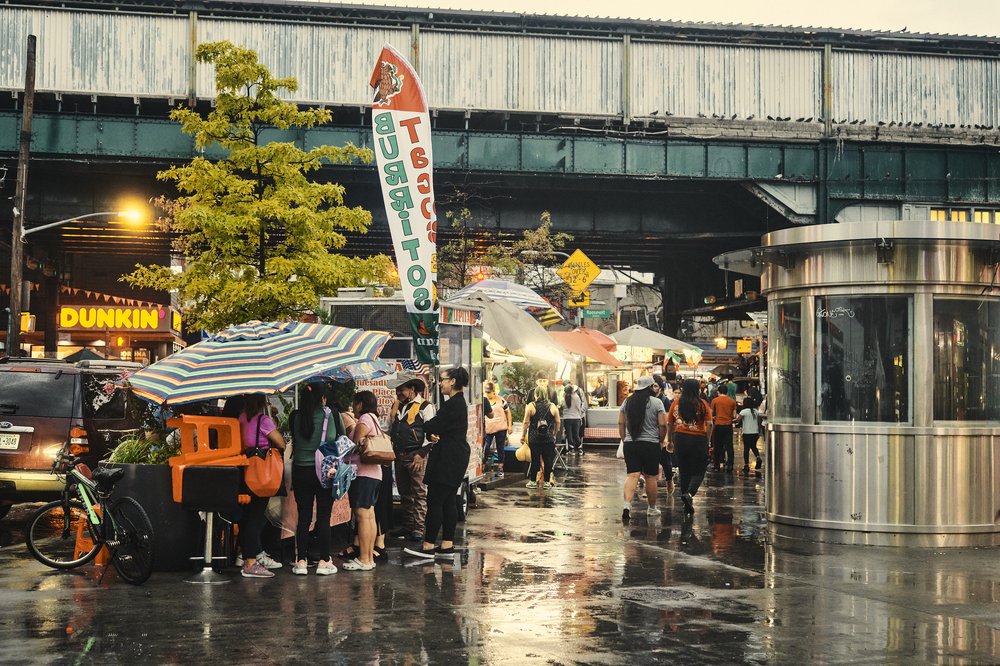More licenses for NYC street vendors? Here's what to know about a pending bill.
May 2, 2025, 3:17 p.m.
A City Council measure up for consideration would gradually lift caps on vendor permits and licenses.

The New York City Council is considering legislation next week that would allow more street merchants to operate legally.
A bill before lawmakers would gradually increase the number of food vendor permits and general vendor licenses made available each year, before ultimately doing away with such limitations altogether.
Only a few thousand permits and licenses currently exist for the estimated 23,000 street vendors doing business across the five boroughs.
Mohamed Attia, the managing director of the nonprofit Street Vendor Project, said the bill would allow vendors a legal pathway to operate, just as other businesses are afforded.
”If you want to open a restaurant today, you don't need to wait 20 years or 30 years to get off a waiting list to open up a restaurant,” Attia said. “That's not the case for vendors.”
Vendors must also follow restrictions on when, where, and how they sell their wares in order to maintain their permits and licenses, according to Carina Kaufman-Gutierrez, SVP’s deputy director.
Viral videos routinely surface of local street vendors being arrested for selling goods without a license or permit. Last June, one such video showed a physical altercation involving a 14-year-old girl accused of selling food in Battery Park without a license.
Such encounters with law enforcement can be especially problematic for street vendors without permanent legal immigration status, at a time when the Trump administration has sought to ramp up deportations of undocumented immigrants.
Nearly all vendors in New York City, 96%, are immigrants, according to a recent report by the Immigration Research Initiative.
Here’s what to know about the state of vending regulation in New York City, ahead of the hearing on Tuesday.
What’s required to operate legally as a street vendor in New York City?
Street vendors selling merchandise are required to have a general vendor license. The number of such licenses has been capped at 853 since 1979.
Food vendors also need licenses to prepare or serve food from a cart, and there’s no limit on the number of such licenses the city can distribute. They also need a permit for their carts or vehicles, of which there are only a few thousand.
The Immigration Research Initiative report found that only a quarter of food vendors have been able to secure a permit. Nearly two thirds of general merchandise vendors are licensed, according to the report.
The City Council recently passed a street vendor reform bill in 2021. What did that bill do?
Local Law 18 of 2021 created a new licensing system for food vendors, adding an 445 extra permits each year for food vendors, on top of the roughly 3,000 permits capped since 1983.
But the health department has missed deadlines to issue extra food vending permits added under the law. And police continue to issue tickets to vendors after the law created a new office intended to take over street vendor enforcement.
How would the proposed bill change street vending?
The pending measure, Intro 431, sponsored by Councilmember Pierina Sanchez, would gradually increase the number of food vendor permits and general vendor licenses available each year for five years. And by July 1, 2029, there would be an unlimited number of permits and licenses.
Brick-and-mortar business owners have long criticized attempts to ease the city’s vending rules, arguing that more vendors and lax laws will lead to more competition, congested sidewalks and dirty conditions. They also claim the existing vending rules aren’t sufficiently enforced.
But vendor advocates said the city’s many other safety and sanitation rules remain in effect to prevent trash pile-ups and overcrowding.
The Independent Budget Office recently released a revised version of a 2024 report on the fiscal impact of permitting all vendors on the waitlist for licenses and permits. The city would receive $59 million in revenue from tax collections, fines and registration fees, according to the report.
This article was updated with additional comment.
Deportation fears play out in Queens. There's an economic cost to that. MTA vendor complaints in NYC nearly doubled in first five months of 2024 After altercation video goes viral, NYC migrant street vendors get an assist Street vendors in Queens contend the NYPD is illegally trashing their seized carts